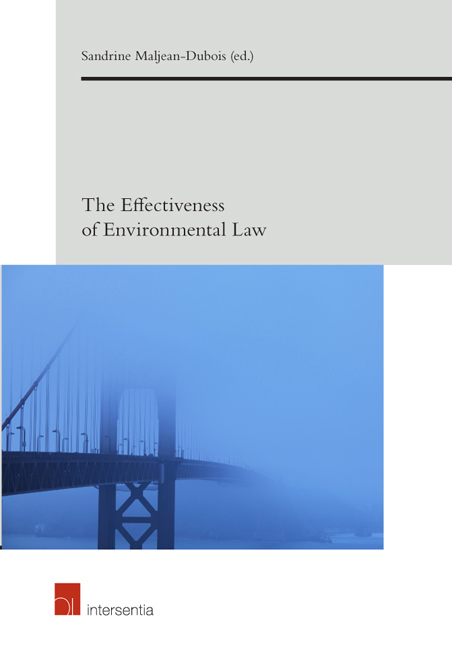Book contents
- Frontmatter
- Preface
- Contents
- Introduction. The Effectiveness of Environmental Law: A Key Topic
- Part 1 Measuring and Assessing Effectiveness
- Part 2 Improving Effectiveness
- Better Legislation
- Better Implementation
- Chapter 11 Towards More Effective Protection of Water Resources in Europe by Improving the Implementation of the Water Framework Directive and the Aarhus Convention in the Netherlands
- Chapter 12 Environmental Inspectors and Public Prosecutors. Is Sharing Information Always Useful?
- Chapter 13 Environmental Damage Caused by Oil Exploitation in Brazil. The “Conduct Adjustment Agreement” (TAC) as a Means to Circumvent Civil Liability Ineffectiveness
Chapter 12 - Environmental Inspectors and Public Prosecutors. Is Sharing Information Always Useful?
from Better Implementation
Published online by Cambridge University Press: 27 September 2018
- Frontmatter
- Preface
- Contents
- Introduction. The Effectiveness of Environmental Law: A Key Topic
- Part 1 Measuring and Assessing Effectiveness
- Part 2 Improving Effectiveness
- Better Legislation
- Better Implementation
- Chapter 11 Towards More Effective Protection of Water Resources in Europe by Improving the Implementation of the Water Framework Directive and the Aarhus Convention in the Netherlands
- Chapter 12 Environmental Inspectors and Public Prosecutors. Is Sharing Information Always Useful?
- Chapter 13 Environmental Damage Caused by Oil Exploitation in Brazil. The “Conduct Adjustment Agreement” (TAC) as a Means to Circumvent Civil Liability Ineffectiveness
Summary
ABSTRACT
In this contribution, we focus on the communication between environmental inspectors and public prosecutors. We model the interaction between both enforcement actors using a sender-receiver model that incorporates the cost factor and the objectives function. The model allows us to identify possibilities by which to optimize the information exchange at this crucial stage of the enforcement chain. We comment on the increasing specialization of public prosecutors in Europe, and in other countries, on the crucial role of effectively written notices of violation and on the issue of strategic information sharing.
“The single biggest problem in communication is the illusion that it has taken place”
George Bernard ShawINTRODUCTION
Environmental law enforcement is a responsibility shared by a variety of actors. Consequently, many formal and informal interactions between different enforcement actors occur. Police forces, specialized inspectorates, public prosecutors, criminal courts and administrative courts all play a role within countries’ environmental administrations. Collaboration between countries is a necessity in the fight against organized crime, cross-border pollution and illegal waste transports.
In this study, we focus on the interaction between environmental inspectors and public prosecutors, specifically the communication of information on environmental offences by the inspectors to the prosecution. This interaction is crucial for the enforcement chain and, thus, for environmental policy at large. It triggers the sanctioning process within the criminal sanctioning track. Criminal sanctioning comprises the hard core of law enforcement, next to administrative and civil sanctioning.
The so-called Eco-Crime Directive, which had to be implemented by the end of 2010, has secured the possibility of criminal sanctioning for the enforcement of serious environmental offences in each EU Member State, whatever its legal tradition in the sanctioning of offences at large and in environmental offences more specifically.
We look at the information exchange that occurs when environmental inspectors communicate official records of offences detected while performing compliance monitoring duties. In most European countries, and in many other countries besides, the environmental case load of public prosecutors is mainly built up through such official records from inspectorates and police forces with a little more extensive or a highly developed level of specialization in environmental compliance monitoring. A factor contributing to this in EU Member States is the rather recent and growing amount of EU legislation on environmental inspections.
- Type
- Chapter
- Information
- The Effectiveness of Environmental Law , pp. 271 - 294Publisher: IntersentiaPrint publication year: 2017
- 1
- Cited by



